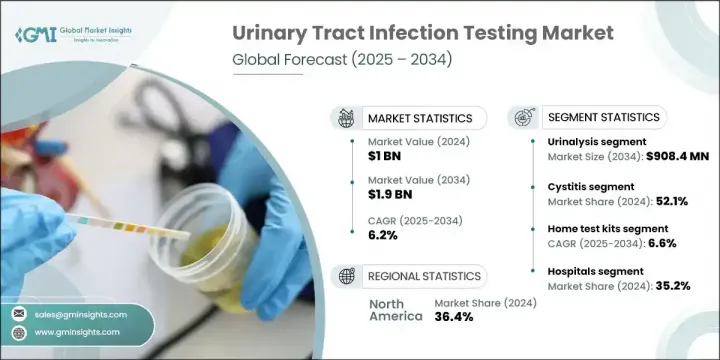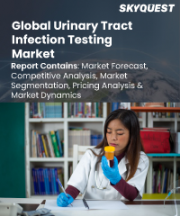
|
시장보고서
상품코드
1801912
요로 감염 검사 시장 : 기회, 성장 촉진요인, 산업 동향 분석, 예측(2025-2034년)Urinary Tract Infection Testing Market Opportunity, Growth Drivers, Industry Trend Analysis, and Forecast 2025 - 2034 |
||||||
세계 요로 감염 검사 시장은 2024년 10억 달러로 평가되었고, CAGR 6.2%로 성장하여 2034년 19억 달러에 이를 것으로 추정됩니다.
이 시장은 요로 결석의 세계 부담 증가, 원내 감염 증가, 신흥 국가의 당뇨병 유병률 증가, 혁신적인 진단 솔루션 출시 등 여러 핵심 요인으로 견고하게 확대되고 있습니다. 당뇨병은 비뇨기 감염에 걸리기 쉽기 때문에 전 세계적으로 당뇨병 환자 수가 증가하고 적시에 효율적인 진단 도구에 대한 수요가 높아지고 있습니다.

요로 감염 검사는 방광, 요도, 신장 및 요관을 비롯한 비뇨기 계통의 다양한 부위에서 감염을 감지하는 데 도움이되는 임상 과정입니다. 조기 진단 및 정확한 치료에 대한 필요성이 증가함에 따라 건강 관리 제공업체는 환자의 효과적인 결과를 지원하는 고급 검사 키트를 채택하고 있습니다. 진단법의 끊임없는 기술 혁신은 무증상 감염의 문제를 조기에 해결하는 데 도움이 되며, 이러한 기술의 광범위한 채택을 촉진하고 건강 관리 시설 전반에 걸쳐 시장 확대를 추진하고 있습니다.
| 시장 범위 | |
|---|---|
| 시작 연도 | 2024년 |
| 예측 연도 | 2025-2034년 |
| 시작금액 | 10억 달러 |
| 예측 금액 | 19억 달러 |
| CAGR | 6.2% |
소변 검사 분야는 2024년 4억 9,410만 달러로 합리적인 가격, 가용성 및 진단 정확도로 평가되었습니다. 소변 검사는 박테리아의 존재를 검출하고 후속 임상 판단을 안내하기 위한 예비 검사로 여전히 선호되고 있습니다. 이 부문의 기세는 생리적 변화와 카테터 및 기타 개입 수단의 사용 증가로 인해 요로 결석 위험이 높아지는 노인 인구가 증가함에 따라 더욱 가속화되고 있습니다.
방광염 부문은 2024년에 52.1%의 점유율을 차지했습니다. 방광염은 가장 광범위한 요로 결석의 하위 유형이며 생물학적 요인으로 여성에게 큰 영향을 미칩니다. 환자의 빈번한 재발은 계속해서 진단 검사의 반복을 촉진하고 관련 검사 솔루션의 사용을 증가시키고 있습니다. 이와 병행하여 방광염의 초기 증상에 대한 사회적 인지의 향상은 교육적인 건강 이니셔티브에 의해 지원되고 있으며, 더 많은 개인이 검사를 받도록 촉구하고 이 분야의 성장을 더욱 가속화하고 있습니다.
북미의 요로 감염 검사 시장은 2024년에 36.4%의 점유율을 차지했습니다. 이는 지역의 견고한 건강 관리 인프라, 고급 의료 진단의 조기 도입, 미국과 캐나다의 요로 결석 환자 수 증가로 인한 것입니다. 특히 노인, 여성, 장기적인 건강상태에 있는 사람들 사이에서 요로결석증례가 증가하고 있는 것이 이 지역에서 요로결석검사산업의 지속적인 확대에 기여하고 있습니다.
요로 감염 검사 세계 시장에서 활약하는 주요 기업으로는 Siemens Health Inners, Acon Laboratories, Cardinal Health, Quest Diagonistics, Thermo Fisher Scientific 릭, 바이오 래드 라보라토리즈, 애봇 라보라트리즈, F. 호프만 라 로슈, 랩코프, 랜드스 라보라토리즈, 포커스 라보라토리즈, 맨카인드 등이 있습니다. 요로 감염 검사 분야의 대기업은 시장에서의 지위를 굳히기 위해 자동화와 디지털 통합에 의한 진단 정밀도의 향상과 검사 소요 시간의 단축에 주력하고 있습니다. 의료 제공업체 및 진단 실험실과의 전략적 파트너십은 제품 가용성과 고객 도달범위를 확대하고 있습니다. 각 회사는 또한 조기 발견을 지원하는 신속 검사 키트 및 포인트 오브 케어 장비 개발을 위한 연구 개발에 적극적으로 투자하고 있습니다. 무증상인 경우에도 신뢰성이 높은 결과를 얻을 수 있는 고감도 분석이나 분자검사의 개발이 중시되고 있습니다.
목차
제1장 조사 방법과 범위
제2장 주요 요약
제3장 업계 인사이트
- 생태계 분석
- 공급자의 상황
- 각 단계에서의 부가가치
- 밸류체인에 영향을 주는 요인
- 업계에 미치는 영향요인
- 성장 촉진요인
- 세계적으로 요로 감염의 이환율이 증가
- 원내 요로 감염의 발생률 증가
- 저소득국가 및 중소득국에서 높은 당뇨병의 유병률
- UTI 검사 제품에 관한 신제품 출시
- 업계의 잠재적 위험 및 과제
- UTI 검사와 관련된 잘못된 결과
- 엄격한 규제 틀
- 시장 기회
- 신속 진단 기술의 확대
- 성장 촉진요인
- 성장 가능성 분석
- 규제 상황
- 북미
- 유럽
- 아시아태평양
- 기술과 혁신의 상황
- 현재의 기술 동향
- 신흥기술
- 가격 분석
- 장래 시장 동향
- 갭 분석
- Porter's Five Forces 분석
- PESTEL 분석
제4장 경쟁 구도
- 소개
- 기업의 시장 점유율 분석
- 북미
- 유럽
- 아시아태평양
- 기업 매트릭스 분석
- 주요 시장 기업의 경쟁 분석
- 경쟁 포지셔닝 매트릭스
- 전략적 전망 매트릭스
- 주요 발전
- 합병과 인수
- 파트너십 및 협업
- 신제품 발매
- 확장 계획
제5장 시장 추정 및 예측 : 검사 유형별, 2021년-2034년
- 주요 동향
- 소변 검사
- 소변 배양
- 감수성 시험
제6장 시장 추정 및 예측 : 검사 키트 유형별, 2021년-2034년
- 주요 동향
- 임상 검사 키트
- 가정용 검사 키트
제7장 시장 추정 및 예측 : 용도별, 2021년-2034년
- 주요 동향
- 요도염
- 방광염
- 신우신염
제8장 시장 추정 및 예측 : 최종 용도별, 2021년-2034년
- 주요 동향
- 병원
- 진단 실험실
- 재택 케어 환경
- 기타 용도
제9장 시장 추정 및 예측 : 지역별, 2021년-2034년
- 주요 동향
- 북미
- 미국
- 캐나다
- 유럽
- 독일
- 영국
- 프랑스
- 스페인
- 이탈리아
- 아시아태평양
- 중국
- 인도
- 일본
- 호주
- 한국
- 라틴아메리카
- 브라질
- 멕시코
- 아르헨티나
- 중동 및 아프리카
- 사우디아라비아
- 남아프리카
- 아랍에미리트(UAE)
제10장 기업 프로파일
- Abbott Laboratories
- ACON Laboratories
- Bio-Rad Laboratories
- Cardinal Health
- F. Hoffmann-La Roche
- Focus Laboratories
- LabCorp
- Mankind
- Quest Diagnostics
- Randox Laboratories
- Siemens Healthineers
- Thermo Fisher Scientific
The Global Urinary Tract Infection Testing Market was valued at USD 1 billion in 2024 and is estimated to grow at a CAGR of 6.2% to reach USD 1.9 billion by 2034. This market is expanding steadily, driven by several core factors such as the rising global burden of UTIs, the growing number of hospital-acquired infections, increased diabetes prevalence in developing countries, and the launch of innovative diagnostic solutions. As diabetes makes individuals more susceptible to urinary infections, the rising number of diabetic patients worldwide is fueling greater demand for timely and efficient diagnostic tools.

UTI testing is a clinical process that helps detect infections in various parts of the urinary system, which includes the bladder, urethra, kidneys, and ureters. The growing need for early diagnosis and accurate treatment is pushing healthcare providers to adopt advanced testing kits that support effective patient outcomes. Continuous innovation in diagnostic methods is helping address the challenge of symptomless infections in early stages, promoting the wider adoption of these technologies and boosting market expansion across healthcare facilities.
| Market Scope | |
|---|---|
| Start Year | 2024 |
| Forecast Year | 2025-2034 |
| Start Value | $1 Billion |
| Forecast Value | $1.9 Billion |
| CAGR | 6.2% |
The urinalysis segment was valued at USD 494.1 million in 2024 due to its affordability, availability, and diagnostic precision. Urinalysis remains the preferred preliminary test for detecting bacterial presence and guiding subsequent clinical decisions. The segment's momentum is further accelerated by the growing elderly population, who face a higher risk of UTIs because of physiological changes and increased use of catheters and other interventions.
The cystitis segment held a 52.1% share in 2024. Cystitis is the most widespread UTI subtype, largely impacting women due to biological factors. Frequent recurrence among patients continues to drive repeat diagnostic testing, increasing the uptake of related testing solutions. In parallel, improved public awareness around early symptoms of cystitis, supported by educational health initiatives, is encouraging more individuals to seek testing, further accelerating segment growth.
North America Urinary Tract Infection Testing Market held a 36.4% share in 2024. This leadership is attributed to the region's robust healthcare infrastructure, early adoption of advanced medical diagnostics, and a growing UTI patient population in both the US and Canada. Rising UTI cases-particularly among older adults, women, and individuals with long-term health conditions-are contributing to the sustained expansion of the UTI testing industry in the region.
Key companies active in the Global Urinary Tract Infection Testing Market include Siemens Healthineers, ACON Laboratories, Cardinal Health, Quest Diagnostics, Thermo Fisher Scientific, Bio-Rad Laboratories, Abbott Laboratories, F. Hoffmann-La Roche, Labcorp, Randox Laboratories, Focus Laboratories, and Mankind. To solidify their market position, leading players in the urinary tract infection testing space are focusing on advancing diagnostic accuracy and speeding up testing turnaround times through automation and digital integration. Strategic partnerships with healthcare providers and diagnostic labs are expanding product availability and customer reach. Companies are also heavily investing in R&D to develop rapid testing kits and point-of-care devices that support early-stage detection. Emphasis is being placed on developing high-sensitivity assays and molecular tests that deliver reliable results even in asymptomatic cases.
Table of Contents
Chapter 1 Methodology and Scope
- 1.1 Market scope and definition
- 1.2 Research design
- 1.2.1 Research approach
- 1.2.2 Data collection methods
- 1.3 Data mining sources
- 1.3.1 Global
- 1.3.2 Regional/Country
- 1.4 Base estimates and calculations
- 1.4.1 Base year calculation
- 1.4.2 Key trends for market estimation
- 1.5 Primary research and validation
- 1.5.1 Primary sources
- 1.6 Forecast model
- 1.7 Research assumptions and limitations
Chapter 2 Executive Summary
- 2.1 Industry 360° synopsis
- 2.2 Key market trends
- 2.2.1 Regional
- 2.2.2 Test type
- 2.2.3 Test kit type
- 2.2.4 Application
- 2.2.5 End use
- 2.3 CXO perspectives: Strategic imperatives
- 2.3.1 Key decision points for industry executives
- 2.3.2 Critical success factors for market players
- 2.4 Future outlook and strategic recommendations
Chapter 3 Industry Insights
- 3.1 Industry ecosystem analysis
- 3.1.1 Supplier landscape
- 3.1.2 Value addition at each stage
- 3.1.3 Factor affecting the value chain
- 3.2 Industry impact forces
- 3.2.1 Growth drivers
- 3.2.1.1 Increasing prevalence of urinary tract infections globally
- 3.2.1.2 Growing incidence of hospital-acquired urinary tract infection
- 3.2.1.3 High prevalence of diabetes in low and middle-income nations
- 3.2.1.4 Novel product launches regarding UTI testing products
- 3.2.2 Industry pitfalls and challenges
- 3.2.2.1 False results associated with UTI testing
- 3.2.2.2 Stringent regulatory framework
- 3.2.3 Market opportunities
- 3.2.3.1 Expansion of rapid diagnostic technologies
- 3.2.1 Growth drivers
- 3.3 Growth potential analysis
- 3.4 Regulatory landscape
- 3.4.1 North America
- 3.4.2 Europe
- 3.4.3 Asia Pacific
- 3.5 Technology and innovation landscape
- 3.5.1 Current technological trends
- 3.5.2 Emerging technologies
- 3.6 Pricing analysis
- 3.7 Future market trends
- 3.8 Gap analysis
- 3.9 Porter's analysis
- 3.10 PESTEL analysis
Chapter 4 Competitive Landscape, 2024
- 4.1 Introduction
- 4.2 Company market share analysis
- 4.2.1 North America
- 4.2.2 Europe
- 4.2.3 Asia Pacific
- 4.3 Company matrix analysis
- 4.4 Competitive analysis of major market players
- 4.5 Competitive positioning matrix
- 4.6 Strategic outlook matrix
- 4.7 Key developments
- 4.7.1 Mergers and acquisitions
- 4.7.2 Partnerships and collaborations
- 4.7.3 New product launches
- 4.7.4 Expansion plans
Chapter 5 Market Estimates and Forecast, By Test Type, 2021 - 2034 ($ Mn)
- 5.1 Key trends
- 5.2 Urinalysis
- 5.3 Urine cultures
- 5.4 Susceptibility testing
Chapter 6 Market Estimates and Forecast, By Test Kit Type, 2021 - 2034 ($ Mn)
- 6.1 Key trends
- 6.2 Laboratory test kits
- 6.3 Home test kits
Chapter 7 Market Estimates and Forecast, By Application, 2021 - 2034 ($ Mn)
- 7.1 Key trends
- 7.2 Urethritis
- 7.3 Cystitis
- 7.4 Pyelonephritis
Chapter 8 Market Estimates and Forecast, By End Use, 2021 - 2034 ($ Mn)
- 8.1 Key trends
- 8.2 Hospitals
- 8.3 Diagnostic laboratories
- 8.4 Homecare settings
- 8.5 Other end use
Chapter 9 Market Estimates and Forecast, By Region, 2021 - 2034 ($ Mn)
- 9.1 Key trends
- 9.2 North America
- 9.2.1 U.S.
- 9.2.2 Canada
- 9.3 Europe
- 9.3.1 Germany
- 9.3.2 UK
- 9.3.3 France
- 9.3.4 Spain
- 9.3.5 Italy
- 9.4 Asia Pacific
- 9.4.1 China
- 9.4.2 India
- 9.4.3 Japan
- 9.4.4 Australia
- 9.4.5 South Korea
- 9.5 Latin America
- 9.5.1 Brazil
- 9.5.2 Mexico
- 9.5.3 Argentina
- 9.6 Middle East and Africa
- 9.6.1 Saudi Arabia
- 9.6.2 South Africa
- 9.6.3 UAE
Chapter 10 Company Profiles
- 10.1 Abbott Laboratories
- 10.2 ACON Laboratories
- 10.3 Bio-Rad Laboratories
- 10.4 Cardinal Health
- 10.5 F. Hoffmann-La Roche
- 10.6 Focus Laboratories
- 10.7 LabCorp
- 10.8 Mankind
- 10.9 Quest Diagnostics
- 10.10 Randox Laboratories
- 10.11 Siemens Healthineers
- 10.12 Thermo Fisher Scientific















